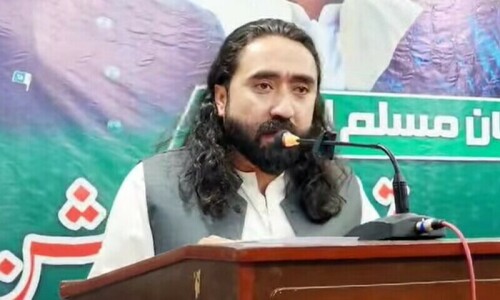QUETTA: Political leaders have called for the recognition of locals’ rights over Balochistan’s natural resources and accountability for the poor law and order situation.
The leaders made these remarks while addressing a multi-party conference (MPC) organised by Jamaat-i-Islami Balochistan on Sunday.
They said the issue of missing persons must be resolved, and the national leadership should come together to address the crisis in Balochistan. These issues, they said, couldn’t be addressed through the use of force.
The conference, presided over by Jamaat-i-Islami deputy emir Liaquat Baloch, was attended by the provincial leadership of all parties.
Balochistan’s right to its resources should be recognised: MPC
The leaders who attended the MPC included Malik Naseer Ahmed Shahwani of BNP-Mengal, Nasarullah Zerey of PkNAP, Khursheed Ahmed Kakar of PTI, Allama Maqsood Domki of Majlis Wahdat-i-Muslimeen (MWM), Asghar Achakzai of ANP, Maulana Kamaluddin of JUI-F, Kabeer Ahmed Muhammad Shahi of National Party, Maulana Hidayatur Rehman Baloch of JI and other leaders.
The representatives of PPP, PML-N, BAP, PkMAP and BNP-Awami didn’t attend the conference despite being invited.
The speakers highlighted the severe socio-economic challenges faced by Balochistan, the most underdeveloped province of Pakistan, with 70 per cent of its population living below the poverty line.
They expressed serious concerns over the prevailing security situation and said that despite spending Rs85 billion on law enforcement agencies, the situation was worsening.
The MPC criticised the financial mismanagement, particularly in the allocation of funds for law and order in Balochistan.
The leaders claimed that there had been no accountability of those responsible for ensuring law and order in the province.
They demanded an inquiry into the use of these funds and criticised the absence of a “responsible leadership” that could tackle the law and order situation.
Mr Baloch, the JI deputy emir, emphasised the importance of restoring political independence and uniting political parties for the “greater good of Balochistan”.
“Until political parties are not independent and united, our issues will remain unsolved,” he stated.
The JI leader cited the “failed promises” of successive governments and noted that the youth of Balochistan could no longer be deceived.
He said Balochistan’s resources belong to its people, and the state’s failure to resolve critical issues like missing persons and political representation was exacerbating the province’s sense of deprivation.
Malik Naseer Ahmed Shahwani, the central leader of BNP, said military operations and the ongoing crisis of missing persons were worsening the instability in Balochistan.
He revealed that in some areas, entire families have been torn apart due to the disappearances of multiple members.
Mr Shahwani also pointed out the lack of accountability in the political process, accusing the government of “ignoring the cries of people”.
He called for a collective political solution, emphasising that Balochistan’s political issues were tied to its resources.
If the right to sovereignty over these resources is recognised, the province can embark on a path to development, he added.
Mr Zerey, the provincial president of PkNAP, urged political leaders to unite and work together under the constitutional framework to address the real issues of Balochistan.
Mr Kakar, the vice president of PTI, emphasised his party’s “long-standing commitment to justice and the creation of a welfare state”.
He criticised the paralysis of institutions, particularly the judiciary, which he claimed has been undermined due to political interference.
Mr Kakar also accused the government of manipulating the elections, resulting in a government that “does not truly represent the people of Balochistan”.
Allama Maqsood Ali Domki of MWM echoed the need for unity among the various political parties in Balochistan to address the pressing issues of the province, including the sovereignty over coastal areas, protection of resources and restoration of law and order.
He also emphasised the importance of upholding the Constitution, calling for an inclusive approach that would unite diverse communities within Pakistan. The conference concluded with the formation of a joint action committee comprising representatives from all parties. The body will finalise a joint action plan to resolve the issues discussed in the MPC.
Published in Dawn, November 18th, 2024
















































Dear visitor, the comments section is undergoing an overhaul and will return soon.